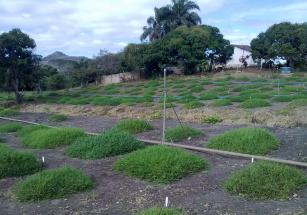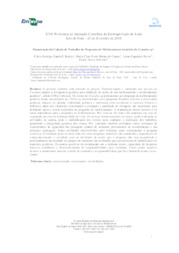Genetic breeding of Cynodon sp genotypes for the different Brazilian soils and climate
Genetic breeding of Cynodon sp genotypes for the different Brazilian soils and climate

Photo: Benites, Flávio
The genus Cynodon (Star and Bermuda grasses), among the existing grasses as alternatives for pasture exploitation, present advantages such as high productivity and forage quality, response to fertilization, resistance to trampling, good adaptation to different types of soils and climate, good tolerance to humid soils and low temperatures. These factors distinguish the genus Cynodon from others that predominate in tropical conditions and justify its choice as a promising alternative for those who seek efficiency in dairy through the sustained intensification of the activity. All the cultivars currently grown in Brazil were indiscriminately introduced, mainly due to the curiosity of dairy farmers, and were not evaluated by a research institute. The cultivars grown in Brazil were introduced from the USA and show susceptibility to biotic and abiotic stresses under our conditions. Thus, the objective of this project is to select clones of Cynodon sp. with agronomic and nutritional performance, resistance and / or tolerance to biotic and abiotic stresses and adapted to the different edaphic and climatic conditions of Brazil. Initially, 500 genotypes from ILRI, 200 genotypes from pasture seeds of cv. BRS Lua and 19 Seleucid clones are under evaluation. These genotypes are evaluated in individual experiments with reference to productivity-related characteristics. The initial goal is to select 30 clones in the experiments with introduced genotypes from ILRI and 30 clones in the experiment from the seed collection of cv. BRS Lua. Subsequently, the 30 genotypes selected from the previous experiments will be evaluated along with the 19 clones of the Seleucid breed, regarding the characteristics related to forage production and quality. The 79 clones will also be evaluated for resistance to spittlebug ( M. spectabilis), tolerance to water stress, waterlogging, shading and aluminum. The cross fertilization rate in populations of Cynodon, the diversity among and within clones and families of the tropical Seleucid breeds will be studied. With data on productivity, nutritional quality and biotic and abiotic stresses, about 10 clones will be selected. The top 10 clones aggregating the maximum number of desired traits will be studied for chromosome number and pollen viability for future breeding actions. The top 10 clones will also be evaluated under different edaphic and climatic conditions to study their adaptability and stability with the objective of selecting clones adaptable to the different edaphic and climatic conditions or clones specific to a given condition. This project is expected to select clones adapted to the soil and climate conditions of Brazil.
Status: Completed Start date: Tue Mar 01 00:00:00 GMT-03:00 2016 Conclusion date: Sat Feb 29 00:00:00 GMT-03:00 2020
Head Unit: Embrapa Dairy Cattle
Project leader: Flavio Rodrigo Gandolfi Benites
Contact: flavio.benites@embrapa.br

